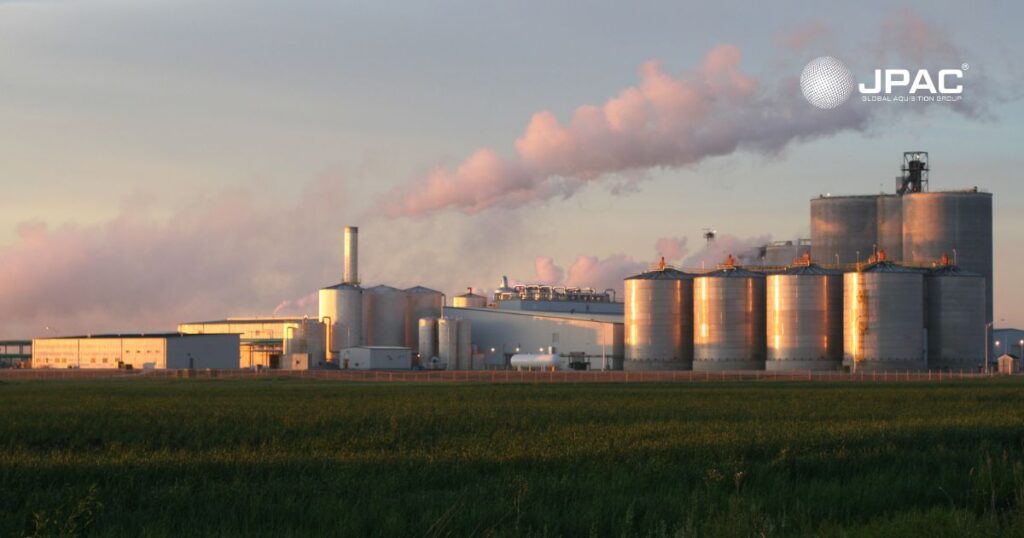In today’s dynamic business landscape, companies seek innovative ways to enhance operations, reduce costs, and contribute to a sustainable future. The power of having your own ethanol plant cannot be understated. As a leading supplier of methyl alcohol, JPAC Global recognizes the significant advantages an EtOH plant brings to companies and industries. This blog post will explore the transformative potential of owning an EtOH plant, highlighting real-world examples of how it empowers businesses and drives success.
Cost Savings and Supply Stability: Ethanol Plant Solutions
One of the key benefits of having your own ethanol plant is the potential for substantial cost savings and enhanced supply stability. Companies can significantly reduce their dependence on external suppliers and volatile market conditions by producing ethanol in-house. This control over the production process allows businesses to secure a stable and cost-effective fuel supply, ensuring smooth operations and mitigating the impact of price fluctuations.
For example, companies in the transportation industry can establish their own EtOH plants to produce ethanol fuel for their fleet. This reduces their reliance on external fuel suppliers and allows them to leverage economies of scale and optimize production costs. By vertically integrating their supply chain, companies can secure a competitive advantage and strengthen their market position.
Diversification and Value-Added Products
Beyond fuel production, owning an ethanol plant opens doors to diversification and creating value-added products. Ethanol can be utilized as a versatile ingredient in a wide range of industries, including pharmaceuticals, cosmetics, and chemical manufacturing. Companies can explore additional revenue streams and expand their product offerings by capitalizing on the byproducts of ethanol production, such as distillers’ grains and carbon dioxide.
For instance, a food processing company can establish an EtOH plant to produce industrial ethanol while utilizing the byproducts to create animal feed supplements. This diversification strategy enhances revenue potential and aligns with sustainability goals by utilizing resources efficiently and minimizing waste.
Environmental Sustainability and Carbon Footprint Reduction
The establishment of an ethanol plant contributes significantly to environmental sustainability and the reduction of carbon footprints. Ethanol, as a renewable and low-carbon fuel, offers a cleaner alternative to traditional fossil fuels, resulting in lower emissions of greenhouse gases and harmful pollutants. By producing ethanol in-house, companies can actively participate in the transition to a greener economy and demonstrate their commitment to sustainability.
For example, an energy company can invest in an EtOH plant to produce bioethanol as a cleaner fuel source for power generation. This shift from fossil fuels helps reduce the company’s carbon footprint, aligns with renewable energy targets, and positions them as a responsible industry leader.
Energy Independence and Resilience
The ownership of an ethanol plant provides companies with energy independence and resilience. By producing their own ethanol, businesses can reduce their reliance on external energy sources, geopolitical factors, and potential disruptions in the supply chain. This enhances their ability to navigate market fluctuations, unforeseen events, and volatile geopolitical landscapes.
An agricultural company establishing an EtOH plant to convert its crop residues into ethanol fuel is a prime example. This adds value to their agricultural operations and provides a reliable and sustainable energy source for their machinery and equipment. Companies can safeguard their operations and maintain business continuity even during challenging times by taking control of their energy supply.
Job Creation and Economic Growth
Establishing an EtOH plant contributes to job creation and economic growth at both local and national levels. The construction and operation of an EtOH plant require a skilled workforce, leading to employment opportunities and the growth of local economies. Additionally, the demand for raw materials, equipment, and ancillary services associated with ethanol production stimulates various sectors, further fueling economic development.
For instance, a company in a rural area can set up an ethanol plant utilizing locally sourced feedstocks, creating jobs for farmers, engineers, technicians, and support staff. This not only provides a boost to the local economy but also strengthens community ties and fosters sustainable development.
Conclusion
The power of owning an ethanol plant extends far beyond the boundaries of fuel production. The advantages are undeniable, from cost savings and supply stability to environmental sustainability and economic growth. Companies can optimize operations, diversify revenue streams, and contribute to a greener future by taking control of their ethanol production. As a trusted supplier of methyl alcohol, JPAC Global recognizes the transformative potential of owning an EtOH plant and encourages businesses to explore this opportunity for success.
Note: The advantages highlighted in this blog post are general and may vary depending on specific industry requirements, regulations, and regional factors. Businesses must conduct thorough research, consult industry experts, and comply with local guidelines to maximize the benefits of owning an ethanol plant.






